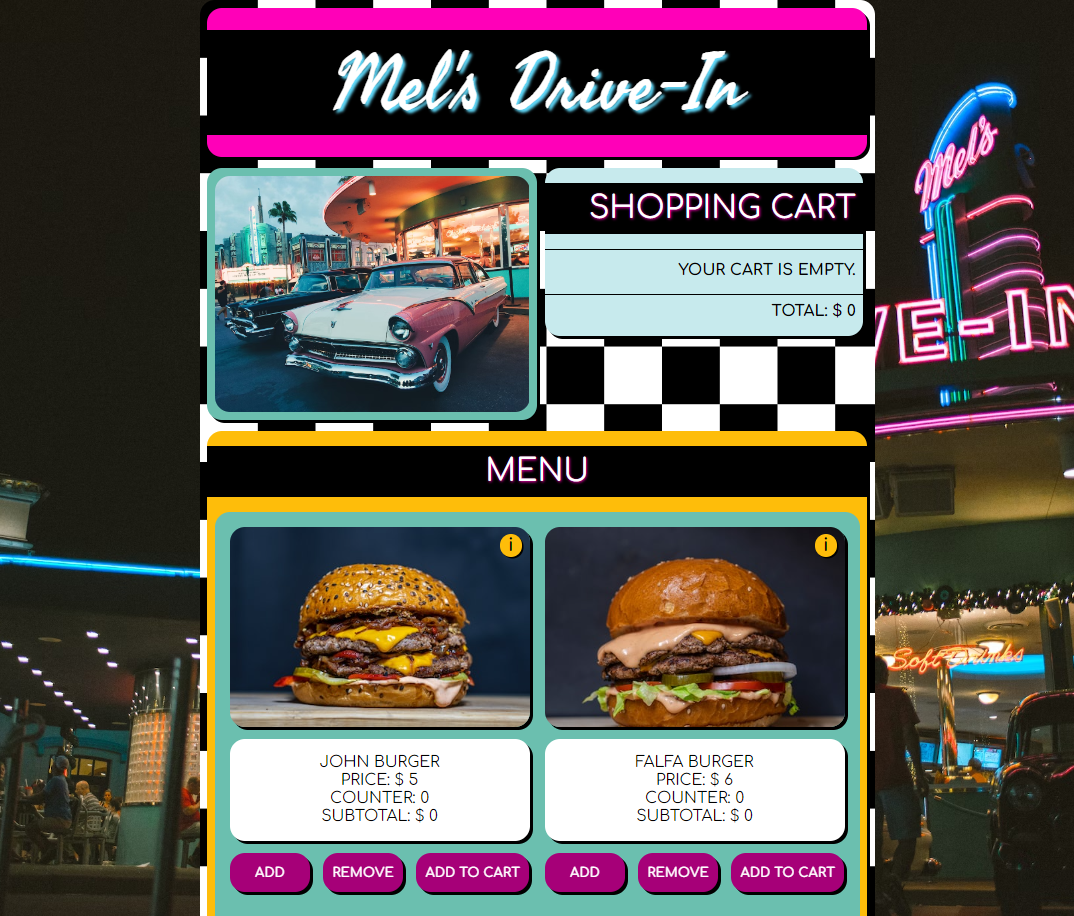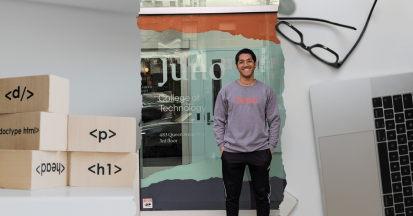Get inspired by Gabe's journey into tech!
We chatted with Gabe Wright about his coding journey, from working at Hydro One, to doing a #1000DaysOfCode challenge, to changing careers with Juno College’s Web Development Bootcamp.
Gabe’s Journey Into Tech
What was your job before Juno?
While pursuing a degree in chemical engineering from Toronto Metropolitan University (formerly Ryerson University), I spent 5+ years as a co-op and new grad at Hydro One in network management engineering roles.
My duties involved automating processes and finding ways to improve productivity by building apps that reduce the administrative burden on teams. These apps were built with a legacy enterprise tech stack used in the power industry.
How did you feel about your job? Why did you decide to make a career change into web development?
I enjoyed the people that I was working with, but I felt boxed-in by the tech stack. I started teaching myself how to build apps using free video courses on LinkedIn Learning (formerly Lynda.com).
Throughout my time as an intern, I got really good at finding creative solutions to problems given the constraints of the legacy systems. One day, my manager asked me to find a better way of processing out-of-province travel requests for the engineering division. Using the legacy tech stack, I built an automated tool that improved efficiency by 75% which was rolled out to 600 employees.
The success of this project cemented a role for me post-graduation. As a new grad, I worked in different teams and continued building web apps throughout the company.
However, when I looked at roles outside Hydro One, I struggled to find any that fit my expertise. I recognized that I needed to learn a more modern skillset and I began listening to coding podcasts to find stories of others who made the transition into tech. These podcasts included Syntax, freeCodeCamp, and CodeNewbie.
I recognized that I needed to learn a more modern skillset and I began listening to coding podcasts to find stories of others who made the transition into tech.
Tell us about your #1000DaysOfCode journey!
I listened to an episode of freeCodeCamp podcast where @swyx talked about his experience with #100DaysOfCode and I figured that the best way for me to learn was over a long period of time.
I saw a benefit in writing daily posts: they forced me to organize my thoughts and identify gaps in my understanding which kept me accountable. Over time, I built a small audience of folks interested in seeing me continue the streak for 200, 300, and ultimately 1000 days.
To stay motivated, I regularly took breaks and adjusted my posting frequency, opting to post only when I felt that I had sufficient learnings to share. When I felt overwhelmed, I reminded myself that I’m doing this #1000DaysOfCode for me, and gave myself permission to adjust the parameters to make it sustainable over the long term.
Why did you choose a Bootcamp program over other learning options?
Throughout my coding journey, I’ve experimented with self-led learning, coding challenges, personal projects, online/part-time classes, tutorials, and books. As I invested time into learning, I felt that I needed a robust Bootcamp curriculum to help me figure out where to prioritize my time.
Juno College's Coding Bootcamp and Beyond
When/how did you come across Juno, and why did you choose Juno over other options?
I stumbled across Juno back when it was known as HackerYou through the Syntax podcast — one of the hosts, Wes Bos, used to be an instructor at Juno. Given that my career pivot took place over a couple of years, I had lots of time to evaluate the options. Once I learned of Juno’s connection with Canada Learning Code, as a minority, I identified with the mission of making tech accessible to underrepresented groups and selected Juno as my first choice.
What was the timeline of your Juno journey?
Two years before making the pivot, I completed the part-time UX Design course at Juno to familiarize myself with a user-centric problem solving methodology. Given that my background was process-centric, I was immediately able to apply what I had learned to my job and led an 8-month UX pilot project aimed at building an internal course management platform for the P&C engineering team at Hydro One.
One year before making the pivot, I signed up for Juno’s part-time JavaScript course as a way to get some much-needed feedback on my projects. I used this as an opportunity to connect with mentors and ask difficult technical questions.
Six months before making the pivot, I told my boss that I was leaving to attend Juno and he offered me a temporary promotion to stay for a few months. Once it wrapped up, I sent in my resignation letter and began preparing for Bootcamp. I had 6 weeks off between my last day of work and starting Juno, so it gave me a chance to take a much-needed break from coding and posting.
In March 2022, I embarked as a member of Cohort 40 at Juno's Web Development Bootcamp. After Bootcamp, I took a volume approach to applying for roles. My goal was to perform as many technical assessments and interviews as possible, so I applied to all types of software developer roles for 5 months until I got my first offer.
What was Juno’s Bootcamp experience like?
The instructors were really great, and I appreciated having the space to ask questions that had been burning in my brain after years of self-study. The cohort was engaged and asked questions relevant to each use case. I appreciated the multi-instructor dynamic, as it gave space for aside discussions whilst not interrupting the main lesson’s momentum.
A highlight was our instructor Esther’s birthday: we found out that her birthday was coming up and it became a running joke that everytime she was mentioned in conversation everyone would type “Happy Birthday Esther” in Slack, which continued for several months. Overall the Slack experience was a lot of fun and made the virtual aspect feel more engaging.

One of Gabe's coding projects - check it out live here!
What was your first job and company after graduating from Juno?
I landed a Software Engineering internship at Wealthsimple, which is an 8-month term on their crypto team. By the time I was interviewing at Wealthsimple, I had enough practice with pair programming that I passed their technical phase and made it to the final stage where I was asked to give a presentation on a project. This was where my UX pilot project came in handy, and I spoke about how I leveraged what I had learned at Juno in my roles at Hydro One.
What are you currently learning and/or working on? What are you hoping to learn or accomplish next in your tech journey?
I’m taking Wes Bos’ Advanced React course which centers around building a ecommerce website using Next.JS, GraphQL, and other goodies. I’m hoping that building an app with production-level complexity will help me adapt to my new role.
My goal is to be a full-stack developer who can appreciate every aspect of a build process including user interviews, UI design, building, architecture, testing, and documentation. Using what I’ve learned so far and my background in engineering, I think that it’s within reach.
What have you learned about yourself during your career change/journey into tech?
I’ve learned that I can navigate through the ambiguity that comes from not knowing what’s coming next in my career. For a long time, I moved towards certainty and planned my next 2-3 moves several years in advance to minimize downtime (i.e. co-op placements and new grad rotations). What I’ve learned recently is that I will be okay if I just take it one step at a time, and that it’s okay to not have it all figured out.
What I've learned recently is that I will be okay if I just take it one step at a time, and that it’s okay to not have it all figured out.
Advice for those looking to change careers?
Get a mental health professional before Bootcamp! For 3 months leading up to leaving my stable job, I met weekly with a counselor to talk about what I would think about myself when I was unemployed for the first time in nearly a decade. The weekly check-ins helped to talk through anxieties and identify patterns related to perfectionism and impostor syndrome.
After Bootcamp concluded, I continued connecting with my counselor throughout the rollercoaster of interviews and rejections. The discussions were instrumental in creating space to process my emotions and allowed me to bounce back quickly throughout months of interviewing.
Advice for Bootcamp grads?
My biggest piece of advice would be to encourage folks to try and get as much interview experience as possible. Apply to everything and book interviews with companies just to see their take home/pair programming assessments. Take note of which technologies are used together and use it to guide your personal projects.
The personal projects that I built after Bootcamp were what got me to the late interview stages at the big tech companies. Once you reach this stage, spend time learning algorithms, data structures, and Big O notation. It’s about getting the right question, on the right day, with the right interviewer.
Last but not least, what do you enjoy most about being a developer?
I love coming up with features that solve users’ problems and seeing first-hand if they’re effective. User feedback is important to me, it challenges my biases and helps me come up with more creative solutions to problems.
In the past, I found joy by building projects but I often worried that my skills wouldn’t transfer to a new work environment. Now, I get to build what I want every day using whatever tech stack that I choose, and it feels great!
You can follow along Gabe’s #1000DaysOfCode here, and check out Gabe’s portfolio here!
Curious about Juno's Web Development Bootcamp?
Juno College's beginner-friendly Web Development Bootcamp is designed to help you break into tech, fast. See what you’ll learn and build below:

